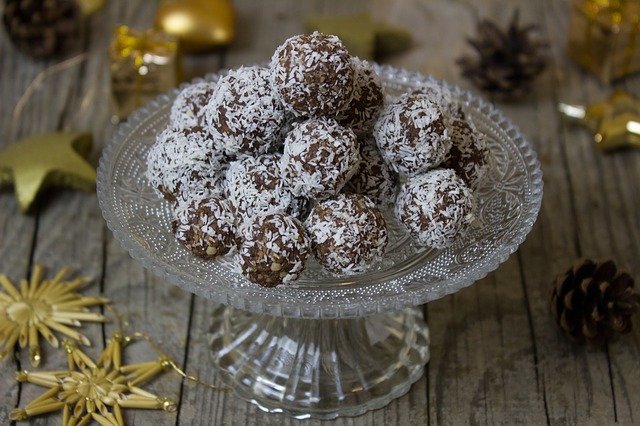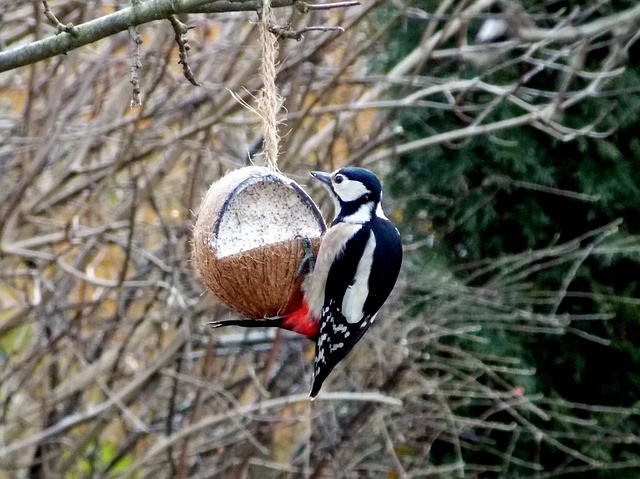If you eat fresh coconut in the summer you’ll be aware that it doesn’t stay fresh for that long. Maybe you’re thinking, can birds eat coconut instead of throwing it away?
The simple answer is yes, birds can eat coconut but first, you need to be aware there are several types of coconut that are suitable for birds cat eat. Understand more below…

Is Coconut Healthy for Birds?
Coconuts are one of the more nutritious offerings nature has to give and with their wide range of nutrients, yes, coconut is healthy for birds, especially as part of a balanced diet.
Ensuring your feathered friends have plenty of nutrition in their diet will keep them healthy in the long term.
Nutritional Content of Coconut
| Typical Values | Per 10g |
| Total Fat | 3.30g |
| of which saturated | 3.00g |
| Carbohydrate | 1.50g |
| of which sugars | 0.60g |
| Fibre | 0.9g |
| Protein | 0.33g |
| Salt | 2.0mg |
| Vitamins and Minerals | |
| Iron | |
| Selenium | |
| Magnesium | |
| Calcium | |
| Vitamin B1 | |
| Vitamin B3 | |
| Vitamin B5 | |
| Vitamin B6 (Pyridoxine) | |
| Vitamin C | |
| Vitamin E | |
| Phosphorous |
Saturated Fat
Birds require high levels of saturated to help keep them warm throughout the colder winter months and also to provide energy during flight whilst hunting for food.
Fats also help birds manage to malt better and can help relieve stress during the breeding season too.
Iron
Low levels of iron can cause anaemia in birds and make them become weak and frail. Too much iron can cause birds to store it in various parts of their body, which is potentially deadly.
Ion should be incorporated into a birds diet and should only be fed in moderation.
Selenium
Feeding birds foods like coconut which contain selenium are particularly beneficial to female birds during laying season and can benefit both the egg and ultimately, the chick.
Magnesium
Magnesium is one of the most abundant minerals in a birds body. It plays important roles in maintaining beak strength, energy levels and nerve regulation.
Magnesium can also help birds with feather quality and maintain a healthy heart and muscle use.
Calcium
Calcium is essential for breeding birds to help strengthen the eggshell and mineralise the chicks skeletal system too. Too much calcium can cause kidney problem in birds.
Vitamin B1
Vitamin B1 helps with the central nervous system in birds and living systems alike. A deficiency of Vitamin B1 (Thiamine) in birds can cause neurological problems.
Vitamin B3 (Niacin)
Vitamin B3 helps to promote and maintain healthy growth, improve feather quality and can prevent deformation in joints.
Vitamin C (Ascorbic)
Vitamin C has similar qualities and benefits to birds as it does in humans. Vit C can protect against illness and help prevent stress in birds during winter or mating season.
Vitamin E
Vitamin E is very beneficial to female birds during pregnancy, egg fertility, laying the egg(s) and helps cells and tissues.
Can Birds Eat Desiccated Coconut?
Do not feed birds desiccated coconut. Upon eating desiccated coconut the flakes quickly rehydrate and expand when the bird consumes them.
Desiccated coconut is coconut flesh that has been grated and dried out. These small coconut flakes may seem suitable for feeding to birds, but they are far from it…

The small flakes of coconut will not swell to large pieces but remember that birds have tiny stomachs, and they won’t stop eating after just one or two bites.
The result of this is that a belly full of coconut flakes begins to expand, causing discomfort in the best-case scenario, and death in the worst case.
The sense of feeling full will also prevent the bird from looking for different types of foods and therefore, the bird will not have a balanced diet and may eventually fall ill.
Can Birds Eat Coconut Oil?
There is definitely mixed opinion about feeding coconut oil to birds, whether they’re pet birds or wild gardens birds.
Firstly, unless it’s cold outdoors then there’s a good chance that the coconut oil will liquefy and run out of the half shell or attract bugs and possibly bacteria.
Many have concerns over whether it’s unsafe for birds to consume oils that turn to solids in cool temperatures. Personally, I wouldn’t feed coconut oil to wild or pet birds.
How to Feed Coconut to Wild Garden Birds?
If you’ve bought a whole coconut to feed your garden birds then first off you’ll have to drill a hole or knock a nail into the shell to remove the milk.
Thread some string through the hole(s) and then tie a few knots to prevent the string from coming back out and then hang from on a bird feeding station or a branch of a tree.

Ensure that the branch is strong enough to help prevent too much swinging of the coconut half and to prevent it from falling off. Place it high enough to prevent cats from prowling…
Hang for no more than 1 day during summer because it will quickly become rancid but in the winter when it’s much colder you can easily leave it hanging for up to 4/5 days.
Always monitor the quality of the coconut or any foods that you give birds as the changing weather can affect the freshness as warm and wet weather is perfect for bacterial growth!